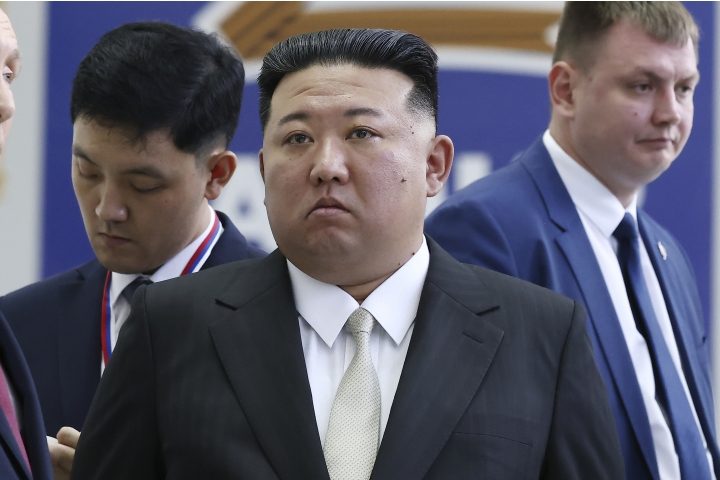
Pyongyang must be prepared to seize South Korean territory in the event of an “emergency,” North Korean leader Kim Jong-un has said.
In a speech marking the 76th anniversary of the founding of the North Korean Army on Friday, Kim lauded the military for “firmly protecting the sovereignty and dignity of the country” from “imperialist military threats, blackmail, and the risk of war.”
Regarding the increasingly hostile ties with Seoul, the North Korean leader said his country has “summarized the history of our people’s division and confrontation and defined [South] Korean puppets as the most harmful and unchangeable enemy” of Pyongyang.
In wake of these events, Kim stated that in the event of an “emergency,” North Korean policymakers had “made a national decision to occupy and pacify [South Korean] territory.”
The warning comes after the North Korean leader excluded the possibility of reunification between Pyongyang and Seoul in late December, contending that both nations abide by diametrically opposing principles. Last month, Kim also called on the national parliament to label South Korea the “number one hostile country.” The parliament immediately agreed to close the agencies involved in promoting reunification with the South and inter-Korean tourism, Pyongyang’s state-run Korean Central News Agency (KCNA) reported.
Kim reiterated his conclusion that reunification of the two Koreas is no longer possible, citing claims that Seoul seeks to force the collapse of Pyongyang to gobble up North Korea. His remarks followed a statement in late December that Pyongyang’s approach to reunification based on “one state with two systems” was diametrically opposed to Seoul’s goal of “unification by absorption.”
Pyongyang and Seoul never signed a peace treaty after the end of the 1950-1953 Korean War, which divided the peninsula, and tensions remain high. In recent months, North Korea has conducted numerous missile launches while slamming its southern neighbor for holding joint military drills with the United States, which has some 30,000 troops based on the peninsula.
Citing U.S. officials, The New York Times reported in January that Washington is worried that North Korea could “take some form of lethal military action” against Seoul. The paper’s sources, however, doubted that Pyongyang would risk anything akin to a full-scale attack.
U.S. officials interviewed by the NYT said that they have not seen “concrete signs that North Korea is gearing up for combat.” They also said, the paper reported, that Kim seems to have bolstered his military and diplomatic position and is perhaps emboldened by a recent rapprochement with Russia.
A full-scale North Korean attack “would almost certainly mean war with the United States,” the article notes, suggesting that Pyongyang could use its vast conventional arsenal to bombard South Korean cities, prompting Seoul and Washington to retaliate. North Korea is also estimated to have up to 30 nuclear weapons, per the Stockholm International Peace Research Institute (SIPRI).
According to unnamed U.S. officials cited by the paper, Washington has taken note of what they described as more aggressive statements by Kim in recent weeks, as well as regular missile and artillery tests.
U.S. officials believe that given recent statements, North Korea could do something resembling its powerful artillery barrage on Yeonpyeong Island in 2010, which followed South Korean exercises in the area. At the time, Pyongyang fired hundreds of shells, killing two South Korean soldiers and injuring more than a dozen.
Seoul retaliated at the time, positing to have killed several North Korean service members. While the exchange was widely viewed as one of the most serious escalations on the peninsula, it still stopped short of sparking a full-scale war.
Also, the North Korean leader blamed the United States for seeking a military confrontation on the peninsula, turning South Korea into a military base and “colonial subordinate state.”
“We don’t want war, but we have no intention of avoiding it,” KCNA quoted Kim as saying. “We will never unilaterally unleash a war if the enemies do not provoke us,” he added, warning that the “enemies should never misjudge this as our weakness.”
In January, former U.S. State Department official Bob Carlin co-authored a report claiming that the situation on the Korean Peninsula is now more risky than at any time since June 1950, when the Korean War began. “Like his grandfather in 1950, Kim Jong-un has made a strategic decision to go to war. We do not know when or how Kim plans to pull the trigger, but the danger is already far beyond the routine warnings,” he claimed.
Furthermore, the Korean Central Telegraphic Agency (KCTA) reported in January that North Korea tested a solid-fuel ballistic missile armed with a hypersonic warhead.
The launch was conducted amid growing tensions with Pyongyang’s southern neighbor, after Seoul recently conducted military drills with the United States near the North’s border.
“On January 14, the Democratic People’s Republic of Korea’s [DPRK] Missile General Bureau performed a test launch of a solid-fuel intermediate-range ballistic missile with a hypersonic maneuverable warhead,” the KCTA said, elaborating that the launch was successful.
The test launch had no impact on the security of neighboring countries and had nothing to do with the “regional situation,” according to the news agency. Last month, Seoul indicated that it will restart military exercises that were halted as part of a 2018 security pact with the North, saying it was mulling scrapping the deal altogether following recent shows of force by the DPRK.
South Korea’s military said it would soon resume the war games, noting they would entail live-fire artillery drills and operations along the land and sea border. Officials alluded to recent shelling by North Korea in areas where such exercises were banned under the earlier agreement, suggesting the 2018 deal had been nullified.
At a press conference, South Korean Defense Ministry spokesperson Jeon Ha-kyou said that canceling the security pact would allow the military to maintain better readiness, but underscored that the ministry still required official approval before a final decision was made.



